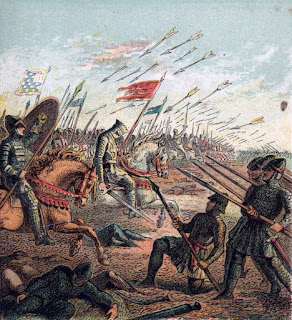Kāore te kūmara e kōrero mō tōna ake reka
The kumara
(sweet potato) does not say how sweet he is
One of the tensions I've found being a writer is the expectation to
(self) promote versus the (Kiwi) cultural attitude of avoiding exactly that.
I've been more in line with the American habit for 'saying it how it is' or, more
to my ears 'talking myself up'.
This year, as I've continued on my journey into te ao Māori (the Māori
world) through language learning, practising tikanga (correct protocols) and
reading and researching mythology and whakataukī (proverbs), I've found myself
less and less incline to say 'hey, look at me. Look at ME. Look at all the good
things I can do!'
The explanation of the whakataukī above is self-evident. I shouldn't
need to tell you how good my books are. If you read them, and like them, you'll
say - if you are so inclined. And, you might tell others. Which is good. In te
ao Māori, you can't give yourself status (mana) - it has to be bestowed upon
you by others. And, only because you use your particular gifts and talents to
aid/assist others in their need.
In the beginning, I was encouraged to blog and tweet and Facebook to
'get [myself] out there.' I put a lot of effort into writing what I thought
'my' audience would like to read but I'm uncertain if I have done that. The story
of Fleance has lived, then gone to sleep, been awoken only to be forgotten
again. I have wanted to walk away from him because, although I think of him as
a wonderful friend, he and the other characters just have not quite given me
what I expected.
2016 has been a year of many changes; some wonderful, affirming moments;
a few crushing disappointments. Like many others doing this writing/blogging
gig, I will take a moment to reflect and, although I have not done nearly a
thorough job of reflecting, these things I know to be true for me now:
1) I love teaching. Nothing else has ever lit my fire, stirred my heart
and soul like a room full of 15 or 16 year olds who ask questions, provide such fresh insight, who show me the parts of the world I did not think to look at. My
students give me more than I can ever give back to them even with how much I try.
2) My job is more satisfying when I focus on one class at a time; one
kid at a time. I can't fix them all; I can't help them to learn everything. But
I can take the time to see the job through, one student at a time. I have
enjoyed watching many successes this year for my students and not necessarily because of them winning awards. Things like finishing a book, loving a story, writing an
amazing account of something that matters, completing a task, being brave - these things make me smile and puff out my chest with pride.
3) Be kind. Always. And apologise quickly when you're not. Own your own
behaviour.
4) I wish I wasn't a writer - most of the time. I
feel guilty when I'm reading because I should be writing; I feel guilty when
I'm watching tv because I should be writing; I don't like that I feel I should
be writing because many great writers have told me that writing is a passion.
For me, it's a condition that I don't think I will ever be free from.
5) I am called to write stories. Dammit. The above understanding is tempered by the knowledge that I now
believe I'm not doing it (this writing gig) for me - there are stories needing
to be told and I've been given the terrible privilege of being the one to tell
these particular stories.
All the best for the summer celebrations (if you are southern hemisphere like me) or the winter holidays (for those in the northern hemisphere).
Kia korowaihia koutou katoa e te aroha, e te manaaki, ahakoa e haere koutou ki hea.
(May you all be draped by love and by support, no matter where you go).
All the best for the summer celebrations (if you are southern hemisphere like me) or the winter holidays (for those in the northern hemisphere).
Kia korowaihia koutou katoa e te aroha, e te manaaki, ahakoa e haere koutou ki hea.
(May you all be draped by love and by support, no matter where you go).





